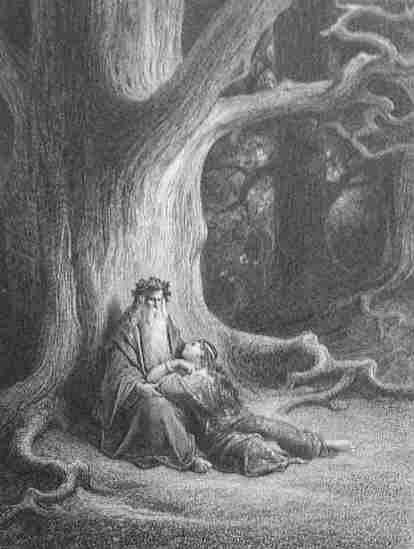
L’astucieuse Viviane était étendue aux pieds de Merlin, by Gustave Doré (1832-1883) from Les Idylles du roi (Paris – 1868), translation of Idylls of the King by Alfred Tennyson
The phrase rift in the lute means sign of disharmony between persons, especially the first evidence of a quarrel that may become worse.
A rift is a crack in an object, and the lute is a musical instrument, symbol of harmony. The phrase is from Vivien, in Idylls of the King (1859), by the English poet Alfred Tennyson (1809-92). Vivien is seeking to coax Merlin into teaching her a magic charm, as an expression of his trust in her and proof that he returns her love. As Merlin will not yield to her request, she declares:
I think you hardly know the tender rhyme
Of “trust me not at all or all in all.”
I heard the great Sir Lancelot sing it once,
And it shall answer for me. Listen to it.“In Love, if Love be Love, if Love be ours,
Faith and unfaith can ne’er be equal powers:
Unfaith in aught is want of faith in all.“It is the little rift within the lute,
That by and by will make the music mute,
And ever widening slowly silence all.“The little rift within the lover’s lute,
Or little pitted speck in garner’d fruit,
That rotting inward slowly moulders all.”
It was not long before the phrase gained currency. The London correspondent for The Inverness Courier (Scotland) of 2nd February 1860, writing about the Pope and “the present Emperor of the French”, Napoléon III, mentioned
the gradually-spreading division between the Pontiff and the Emperor—that “little rift within the lute” which has been “widening ever” for the last six months.
One James Smethan used the phrase in Hints on experimental godliness, published in The Christian Miscellany, and Family Visiter (London – 1869):
We have often thought that there are slight, and apparently trivial sayings dropping from the lips of professing Christians, which […] indicate that their whole views and life are altered for the worse; raising a fear that, ere long, they will be in the full career of unbelief, or heresy, or sin. “The little rift in the lute,” even though, as yet, the notes sound nearly true,—the first glistening white speck of leprosy, from which the soft down no longer springs, have no greater significance than have some slight, airy expressions of doubt, or disdain, or discontent, or anger with the forms of doctrine, or the modes of worship, or the manifestations of character in the Church to which the speaker belongs. The tentative, obscure way in which deep inward changes first reveal themselves, forms one of the difficulties of the case. It cannot be touched, cannot be answered. The short sentence comes from too deep a gulf of conviction or emotion now to be sounded. The “rift in the lute” admits of no patching. The body of the delicate instrument is “all, or not at all.”
The following, from The Stage (London) of 23rd August 1973, is the beginning of the review of Buttons, the last episode, broadcast on 19th August on Granada Television, of the series of plays Once Upon a Time:
The end of a fairy-story always leaves us unsatisfied, doesn’t it? “And they all lived happily ever after” is not enough. Every child is aware of it, and demands to know more. For life goes on, refusing to make any event into a neat parcel. There is no end to any situation except the end of everything. A story, on the other hand, has to end somewhere. All rather unsatisfactory, certainly, but simply a convention one has to accept. Wiser so, as Alun Owen’s play amply proves.
Cinderella (Adrienne Posta) has married her Prince Charming (Rula Lenska) and has settled down to the aforesaid happiness. But there is a rift in the lute, a fly in the ointment, a wasp on the wedding-cake — and it is Buttons (Tommy Steele). Willing fellow that he is, he’s always worshipped Cinderella and at one time even hoped that she might be his but of course you know all that! Now, he has become something of an embarrassment, for he knew her long before she made the big time and is more than willing to talk about it. Obviously, he’ll have to go!
